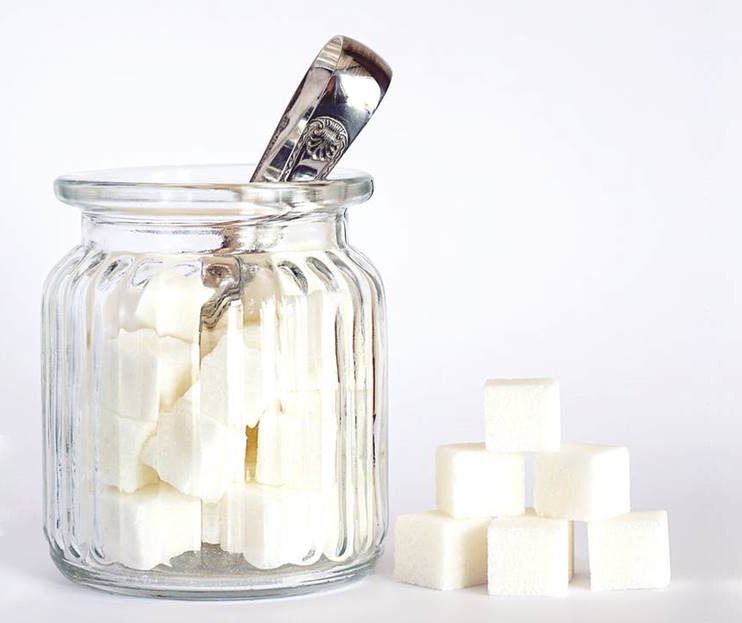Recently, I had a fresh look at my processed sugar consumption (white sugar, molasses, maple syrup, etc.) and helped clients answer the question, “Can you really give up sugar?”
Like many of us, it seems state of the world has been influencing my food choices. Not long ago, I reached a point where I was buying several extra-large brown butter chocolate chip cookies every few days. This was a very bad sign that I had fallen (again) down the white hole.
Because sugar creates inflammation in our bodies, and because definitive research showing that along with inflammation, sugar brings on brain fog, I can only claim my brain was so foggy I couldn’t make good, healthy decisions regarding the chocolate chip cookies. That’s my story, and I’m stickin’ to it. 😉
For our short science lesson today let’s look at what sugar does to your body:
Inflammation
Years of consuming too much sugar cause the delicate mix of bacteria in our gut (remember the gut is our second brain) to become so imbalanced we lose all the protective qualities of the good bacteria that once lived there. For more on this, check out my article on the Gut-Brain Connection.
All that sugar we consume results in inflammation that zooms straight to our brains. This action causes not only the aforementioned brain fog, but actually kills brain cells. Our brains shrink. No kidding.
High Blood Sugar
Dr. Vera Novak, M.D., Ph.D. of The Harvard Mahoney Neuroscience Institute looked at how sugar affects the brain and found insulin resistance or “high blood sugar” (and often resulting diabetes) over time attacks the functional connectivity of the brain.
Insulin resistance develops when the cells can’t process insulin properly and it backflows into the blood stream, creating high blood sugar, a term we hear consistently. We now know that insulin resistance is a major component contributing to dementia and Alzheimer’s.
Vascular Disease
From insulin resistance we end up with vascular disease, which affects the small blood vessels in the brain, reduces blood flow, and causes vascular dementia.
In dozens of studies, many scientists find the same results to be true. To repeat, there’s a strong connection between high sugar consumption and Alzheimer’s.
High sugar intake also results in a variety of chronic diseases related to inflammation – heart disease, cancer, arthritis – as well as all forms of gastro-intestinal disease.
Knowing that sugar can cause anxiety, sugar can cause palpitations, and sugar can make us fat, we might be ready to give up sugar and adopt a new eating plan.
Mediterranean Diet
Time for some Good News!
Dr. Martha Clare Morris, director of the Rush Institute for Healthy Aging, analyzed data from 923 people ages 58 to 98 who kept detailed food diaries about what they ate from 2004 to 2013. Dr. Morris found those who adopted the Mediterranean Diet* had a 50% drop in the development of Alzheimer’s (a form of dementia) compared to those eating a typical American diet of processed foods, high amounts of red meat, sugar, white flour, all fake sugar, diet sodas, and fried foods. Even ten years later, her research hold true.
I am a front-row cheerleader for adopting the Mediterranean Diet, as years ago it became my way of eating. Not that I don’t occasionally cheat—those chocolate chip cookies sometimes beckon—but I really try to stick to that diet a majority of the time. And, not only does that food taste good, I love knowing that I’m eating well.
Here’s a plan that has worked for me, and others with whom I’ve shared it:
- I start by cutting back my sugar consumption by 50%, this red-hot minute.
- I will do that for a week, then cut that by 50%, then 50% each week for a month, until I am getting my sweet fix from berries or other low-glycemic natural sugars—like eating an orange.
This is how I think I can manage changing for the long-term.
But, I know I will fail at some point, slip up and drop three handfuls of M&M’s into my mouth one afternoon because I am having a bad day. And, that will be O.K. One indiscretion will not delete all my efforts. It isn’t a zero-sum game. Thank God. When I have an M&M fall-out, that night I will add to my gratitude list that I am grateful I only needed three handfuls to make me feel better, instead of the entire bag. I am making progress.
Alternative Sweet Options
Giving up sugar doesn’t mean your life will be without sweets. Summer makes it easier for me to stick to this plan and move toward eliminating all processed sugar, including wine, except for special occasions, because of all the delicious fruits in season.
I love the berries and I could live solely on watermelon and the luscious ripe berries (so much better than winter’s offerings grown in a hothouse.) Well, yum! The berries are so low on the glycemic index (GI) I can have them anytime. I save the other fruits higher on the GI for a delicious dessert in place of a piece of Key Lime pie.
The bounty of vegetables also helps release us from our sugar addiction. Just watch the GI for those veggies that score over 50.
What happens when we give up sugar and fill up on fresh, organic veggies, fish, lovely salads, and ripe fruit? Our gut flora rebalances in no time, our waistline trims, and our brain fires on all cylinders. Now, that’s a blue ribbon combination!
Until next time… Be Vibrant!
*https://www.mayoclinic.org/healthy-lifestyle/nutrition-and-healthy-eating/in-depth/mediterranean-diet/art-20047801
Share Your Thoughts…
Have you ever tried giving up (or drastically cutting back) on sugar? What was your experience? Share in the comments below.
